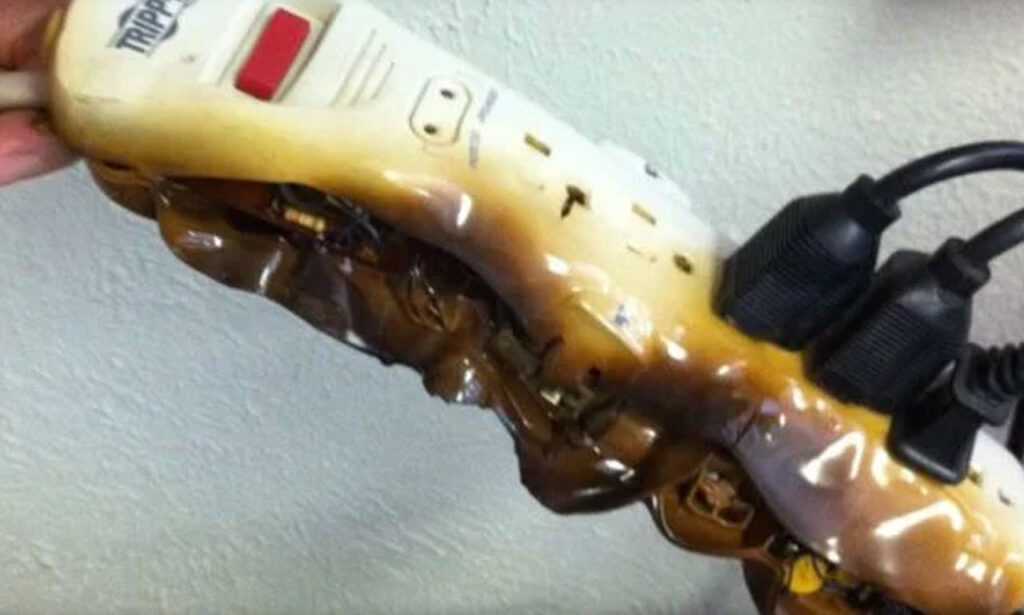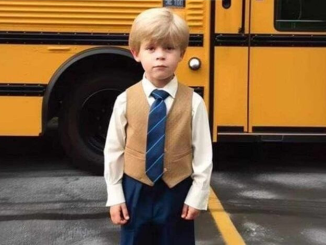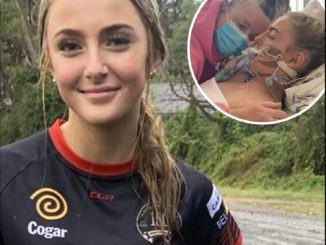
“I’m telling you, we need better locks for the cans,” I suggested one morning as Kyle angrily watched me scoop up the scattered garbage. “Maybe some chicken wire around the garden too. My sister Jane says that worked for them.”
“I don’t care what your sister says. What we need is to get rid of them. Permanently.”
I remembered when we first met, how his spontaneity had seemed charming. Now, at forty, that impulsiveness had morphed into an iron-fisted need to control everything, including me.
“Kyle, please. Can’t we try the peaceful way first?”
He jabbed a finger at me. “You always do this, Josie. Always trying to make everything complicated when there’s a simple solution right in front of us.”
“Simple doesn’t always mean right.”
He slammed the broom against the side of the house. “What was that?”
I flinched. “Nothing. I’ll look into better trash cans today.”
That weekend, I found Kyle in the garage, assembling something metallic.
“What’s that?” I asked, though I already knew. Animal traps.
He didn’t look up. “Insurance. These smart traps will catch anything that comes near our trash.”
“Kyle, please. They could hurt them.”
He slammed down his screwdriver. “That’s the point! I’m so sick of you defending these disease-carrying vermin. You act like they’re some kind of pets.”
“They’re not pets, but they don’t deserve to suffer. Maybe if we just—”
“Maybe if we just what, Josie? Let them take over? Build them a guest house while we’re at it? I’ve had it with your bleeding heart routine.”
I felt tears welling up but forced them back. “Why does everything have to be solved with violence? They’re just hungry animals, Kyle.”
He stood up, his face red. “You want to know what I think? I think you care more about these pests than our home. Than me.”
“That’s not fair.”
“Isn’t it? Every time I try to solve a problem, you fight me. The raccoons, the neighbor’s dog that keeps barking all night, even that group of teens that hangs out by our fence.”
“Those are all living beings, Kyle. Not problems to be ‘solved.’”
“This is my house!” he yelled, making me jump. “I work every day to pay for it, to keep it nice, and I’m not going to let some animals destroy it while my stupid wife takes their side!”
When the raccoons started showing up again this spring, Kyle completely lost it.
That evening, I was folding laundry when he stormed in, waving a piece of paper and grinning like he’d won the lottery.
“You’ll never guess what I found at the hardware store. Industrial-grade pest control. Guaranteed to solve our little problem.”
I took the paper. It was a receipt for animal traps and some kind of poison. My hands started trembling.
“Kyle, you can’t be serious. That stuff could kill them!”
He snatched the receipt back. “That’s the point, Josie. God, sometimes I think you’re being dense on purpose.”
“But what if neighborhood cats get into it? Or someone’s dog? We could get in trouble.”
Kyle’s face darkened. “I’ve made up my mind. The raccoons are gone by the end of the week, one way or another.”
I spent that night tossing and turning, my mind racing. When did the man I married become someone who could so casually talk about killing innocent creatures?
I thought about calling Jane, but I already knew what she’d say. She’d never liked Kyle and always said there was something off about him. Maybe I should have listened.
The breaking point came on a quiet Tuesday night two days later. I was reading in bed when I heard rustling outside. Peering through the window, I saw one of the trash cans had been knocked over again.
I slipped on my robe and grabbed a flashlight. As I approached the mess, something caught my eye. It was a black garbage bag, partially open, with something moving inside.
My hands trembled as I reached for it. “Oh no. No, no, no…”
Inside were three tiny raccoon babies, barely old enough to open their eyes. They were squirming weakly.
“Kyle!” I screamed, cradling the bag close. “Kyle, get out here right now!”
He appeared on the porch, looking annoyed. “What are you yelling about? It’s the middle of the night, you crazy woman!”
“Did you do this?” I held up the bag. “Did you throw away baby animals like they were garbage?”
He shrugged. “They’re pests. I’m handling it.”
“Handling it? They’ll die!”
“That’s the point, Josie. Jesus, why are you so naive? They’re just raccoons!”
“Just raccoons? They’re babies, Kyle! Living, breathing creatures that feel pain and fear. How would you feel if someone threw you away to die?”
He laughed, a cold sound that made me shiver. “Now you’re comparing me to a raccoon? How dare you, Josie?”
“I’m comparing you to someone with empathy, and you’re coming up short.”
Kyle stepped closer, his voice a chilling growl that made my blood run cold. “You know what your problem is? You’re soft. Always have been. The world isn’t some fairy tale where we all just get along. Sometimes you have to be tough.”
“Tough? There’s nothing tough about hurting something weaker than you. That’s just cruel.”
I looked at him and wondered how I’d never seen the cruelty that had always been there.
The next morning, I called every wildlife rescue in the area until I found one that could help. A kind woman named Marla showed me how to feed the raccoon kits with a tiny bottle.
“You’re doing great,” she assured me, watching as I cradled the smallest one. “They’re lucky you found them when you did.”
As I watched the kit suckle eagerly, tears rolled down my cheeks. “I just don’t understand how someone could be so cruel.”
Marla squeezed my shoulder. “Sometimes the animals we save end up saving us too.”
That evening, I found Kyle’s journal and a detailed plan for dealing with the “raccoon infestation.” It included poison locations, trap placements, and even a schedule. The methodical cruelty of it made me sick.
When Jane arrived, she saw the journal in my hands.
“Still think I’m overreacting?” I asked, showing her the pages.
She shook her head. “Josie, this isn’t about raccoons anymore. Maybe it never was.”
“I know,” I whispered. “I think I’ve always known.”
The divorce papers were served a week later. Kyle didn’t seem surprised, just angry. As always.
“You’re really throwing me out over some pests?” he spat as he packed his things into boxes.
I stood my ground in the doorway of what was now my house alone. “No, Kyle. I’m ending this because of who you’ve become. Who you’ve always been, maybe, and I just didn’t want to see it.”
Days turned into weeks. The raccoon kits grew stronger.
The smallest one was shy and always hid behind his siblings. The middle one was curious about everything. And the biggest was protective, always watching out for the others.
Marla helped me release them back into the wild when they were ready. As we watched them toddle toward the treeline, I saw movement in the bushes. There, watching us, was their mother.
“Look,” Marla whispered. “She came back for them.”
The mother raccoon chittered softly, and her babies ran to her. Before disappearing into the forest, she turned and looked right at me. In that instance, I felt a connection to something larger than myself. Compassion.
“You know,” Marla said, “there’s an opening at the rescue center if you’re interested. We could use someone with your kindness.”
I smiled, feeling lighter than I had in years. “I’d like that.”
“You know, Josie, you can tell a lot about a person by how they treat animals. They’re like a mirror that reflects our true selves.”
Looking back, I realized the raccoons hadn’t just been victims of Kyle’s cruelty. They’d been my wake-up call. Sometimes it takes seeing someone else’s vulnerability to recognize your own.
As the raccoons disappeared into the trees, I took a deep breath and felt ready for a fresh start. I knew I deserved better, and that someday, I’d find the right person who saw the world with the same compassion I did.
9 things you should never plug into a power strip

When we think of the past, one of the first thoughts that runs through our mind is how people lived without electricity. Nowadays, we can’t even imagine a day without it because all of our appliances and devices run on electricity.
The truth is, however, that most homes don’t have enough power outlets to keep everything running and charged, so most of us rely on power strips without being aware that appliances that consume a lot of energy become dangerous fire hazards when we plug them into a power strip.
Although power strips are the thing to go to when it comes to charging your phone or power an entertainment setup, there are certain devices that should never be plugged into a power strip.
Air conditioners, space heaters, toasters, and other appliances that use high wattage can easily cause power strips to overheat, which can easily lead to a fire hazard.

Even before plugging anything into a power strip consider the ammount of power they support. This is usually listed on the product itself.
High-capacity appliances need to draw a lot of power through an electrical circuit to work. Keep in mind that an appliance does not need to be large in size to draw large amounts of power.
Below is the list of appliances that should never be plugged into a power strip.
1. The oven: Even though the oven is not used continually, it is a power-hungry appliance that should not be plugged into a power strip. In fact, it should be plugged into its own wall outlet on its own circuit.
2. Refrigerator: Refrigerators require a lot of power and frequently cycle on and off which can easily overload a power strip and cause damage. Much like the oven, refrigerators require a wall outlet dedicated solely to powering the appliance.

3. Washing Machine: When turned on, washing machines pull a lot of power. This is the main reason why these appliances shouldn’t share a receptacle with any other appliance or device.
Most washing machines use a max of up to 1400 watts, putting it dangerously close to the max load of most power strips. On top of that while working, washing machines are usually left unattended and work longer hours, at least an hour, which is long enough for a power strip to overheat.
4. Heating: Portable heaters should never be plugged into a power strip because most of them use 1,500 watts of energy on their high setting and they usually run for extended periods of time.

5. Microwave: Since they consume a lot of energy when used, most microwave ovens are plugged into their own receptacle and that is always a good practice.
6. Coffee Maker: Those who own a coffee maker are not fully aware of the power these appliances use, and this is why they should never be plugged into any sort of power strip or extension cord.

7. Toaster: You may think that browning up slices of bread or bagels doesn’t require a lot of energy, but the truth is that toasters use a lot of energy when in use and they should be plugged directly into the receptacle rather than a power strip.
8. Another Power Strip: Power strips are not meant to be used in conjunction with another power strip, although many people do exactly that. This, however, violates most safety codes because it can easily lead to overloading the electrical system.
9. Electronics (Computer, TV, Router): These types of electronic devices don’t necessarily use a lot of power on their own, but they are sensitive to surges and you can find yourself with a burnt out computer or TV very quickly if you plug them into a power strip.
If you want to protect these sensitive devices from power surges, opt for a power strip that functions as a surge protector.



Leave a Reply